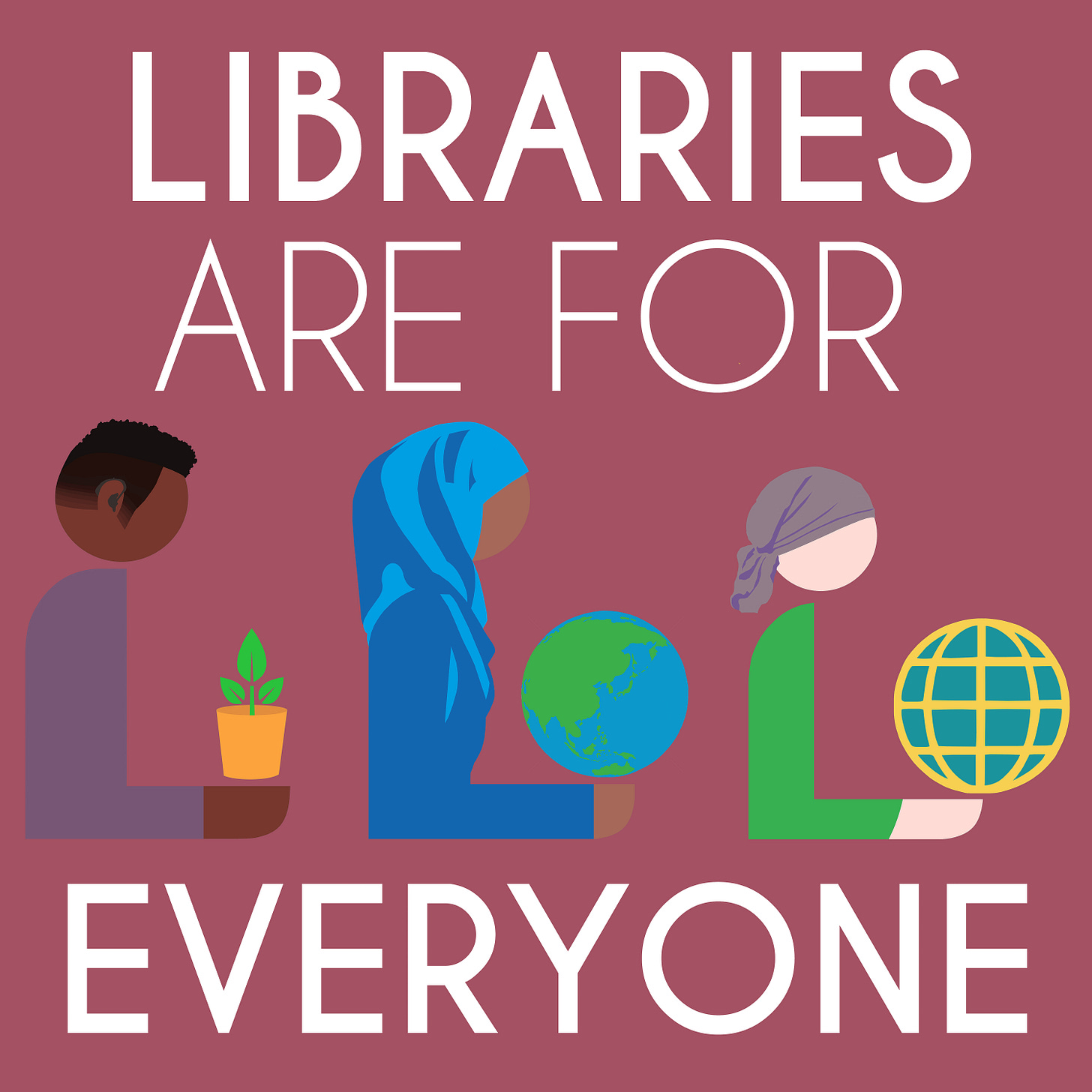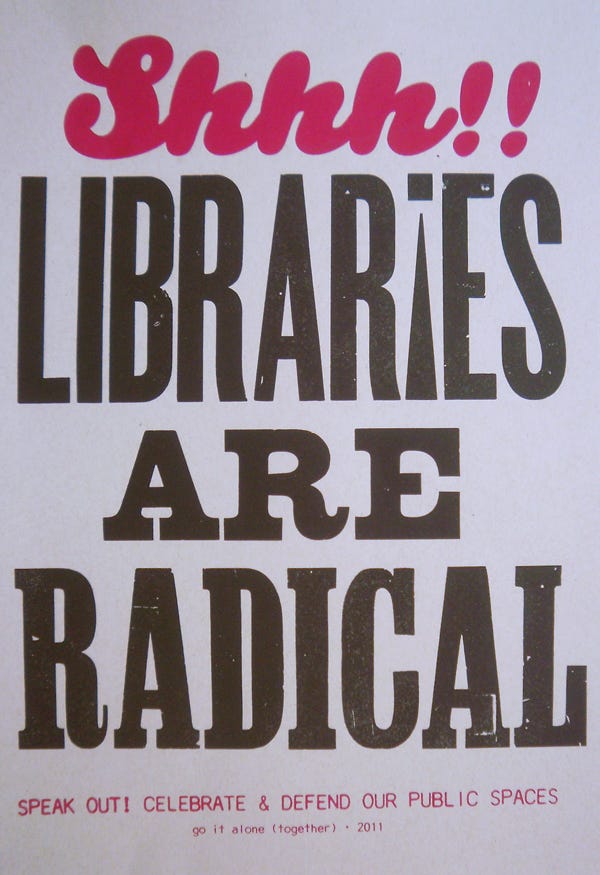✨Reminders✨
The Guerrilla Feminist is reader-supported! Thank you to the folks who pay monthly to support my work. If you want to upgrade to paid, go here.
Add your favorite song to The Guerrilla Feminist Spotify Playlist!
Please share my writing with your community and comrades! Forward this email to a friend, put it in your own newsletter, screenshot and share it on social media.
I worked in a Gender & Women’s Studies librarian’s office for eight years. Previously, I had always loved libraries (and librarians). After I had worked in a library for three years, I decided I loved it so much that I wanted to go back to school. In the fall of 2017, I started my first semester of library school at UW-Madison. I was working full-time and I was a student part-time. Some of the coursework was dense, but I also knew why it was important. Librarians do a lot of things and many of these things are not even known about! I graduated with my master’s in Library & Information Science in spring of 2020, right as Covid was bursting at the seams.
There is a strong history of radical librarians/libraries and this history has always inspired and invigorated me. Though there is a lot of activist history here, it’s important to also note the foundation of oppression that libraries were built on. Libraries have historically acted as locations and symbols of institutional oppression, white supremacy, and grew from sites managed by churches (Sierpe). During the Period of Enlightenment, libraries were strictly for rich white people, and the goal was to educate more rich white people (de jesus). It was only in the 1950s and 1960s (during the Civil Rights Movement) that libraries and librarians began to vocally reject the injustices of the time. Many activist efforts have existed to uproot the library as an institute of oppression, though there is still a long way to go.
Here’s a (very) brief timeline of U.S.-based librarian activism:
1950: Women’s roles in libraries became activist endeavors
When women began working outside the home in the 1950’s, many took on part-time librarian positions (Suzanne Hildenbrand). “Library Feminism” evolved due to Feminist Task Force (1970) as part of ALA, followed by Independent Women Library Workers (1970), and The Committee on the Status of Women in Librarianship (1976).
1970: Caucus of Gay Librarians in ALA
In order to get the attention of others at an ALA conference, they held the first ever gay kissing booth, called “Hug a Homosexual”

1980: Librarians For Nuclear Arms Control
This org sought to keep the world from ending in nuclear war, to protect civilization and its knowledge and culture from being destroyed.

1990: Progressive Librarian’s Guild was created
Formed in New York City on January 1990 by a group of librarians concerned with the profession's drift into alliances with the business industry.
2013: Librarians and Archivists for Palestine was created
Librarians, archivists, and other information workers (from US, Canada, Sweden, Trinidad & Tobago, and Palestine) traveled to Palestine in 2013. The aim was to learn how Palestinian voices and information about Palestine do or don’t reach the rest of the world, and how Palestinians can or can’t access information under Israeli settler colonialism.
2017: “Libraries Are For Everyone” campaign
After the 2016 elective, more librarians spoke out against mis/dis-information. When Trump announced the temporary travel ban on seven Muslim-majority countries, librarian and artist Rebecca McCorkindale created a series of images for libraries.
2020: Librarians and libraries provided Covid test kits and masks
Since the pandemic started, many libraries have provided Covid test kits, masks, and general education about the virus to keep their communities safe.
2021-Present Day: Fighting Book Bans
Libraries have struggled to combat book bans that have been occurring across the U.S. Book banning has always existed, but not at this scale for a very long time. The current resurgence started in 2021 from various conservative parents and Republican government entities. In 2022, “Texas saw the highest number of both attempts to restrict books and the number of titles challenged in each attempt.” Unfortunately, librarians can only do so much to fight these bans, especially public librarians since their funding is threatened. ALA does have a “Banned Books Week” program for librarians/libraries to use to educate and inform.
Librarians are still very much radical, and libraries are still one of few places a person can go without spending money. Public libraries, specifically, are noted as a “third” place, referring to the fact that they are a separate entity from work and home where people can go for stress relief from the other two places. Of course not every library might be relaxing or unproblematic, and of course not every librarian is radical. I also want to be careful here about adding to the extensive vocational awe within librarianship. There are problems everywhere.
Though many public libraries and librarians are radical and engage in various activist endeavors, there are still those who take a more conservative approach. There are still those who believe a librarian should be neutral, even though neutrality is impossible. The materials, knowledge, subject headings, and technology within libraries are all biased. Neutrality is counter to other professions as well. It also prevents librarians from doing other necessary parts of their jobs, like engaging with the community. Nobody, including librarians, can ever be truly neutral, nor should we try.
The current political situation of libraries in our culture is one of liberalism, argues de jesus. Liberalism is the new Enlightenment. There is a lot of work to be done to make libraries welcoming and inclusive spaces to our marginalized community members. Academic libraries, especially, must decide if they would like to be inclusive and physically open spaces or continue to be for university-card-carrying-members only.
de jesus writes:
Realizing the emancipatory potential of the library as institution would require breaking and disrupting the system of intellectual property and other aspects of capitalism, especially the publishing industry. It would require disrupting the empire’s mechanisms for creating ‘knowledge’ by being more than a repository for imperial knowledge products. It would require supporting Indigenous resistance to the settler state and working towards dismantling anti-Blackness.
…Libraries really could come to represent and embody freedom. They could become focal points for the free exchange and access of ideas, knowledge, and imagination.
If we truly want libraries to be sites of activism, community, and care, then we need to rebuild from the ground up.
A Chance to Hold Israel–and the United States–Accountable for Genocide - Medea Benjamin, Nicolas J.S. Davies
ICYMI: How Do You Stay In a Job You Hate - Ask GF for this month!
On Zionism, Sexual Coercion & Biologically Essential Judaism - Dade Lemanski
no, calling out hyperconsumption is not sexist -
Four Black Artists on What It Means to Be Seen - Maya Pontone
The Catholic Hospital System Killing Women -
Also ICYMI: (rough) second chapter of my book: Disability & Desire
Mood:











Love this summary about radical and liberal librarianship! Thanks for bringing this forward.
Its difficult enough to find out the actual title when the patron requests *Oranges and Peaches* even without having a thermonuclear warhead landing on the reference desk